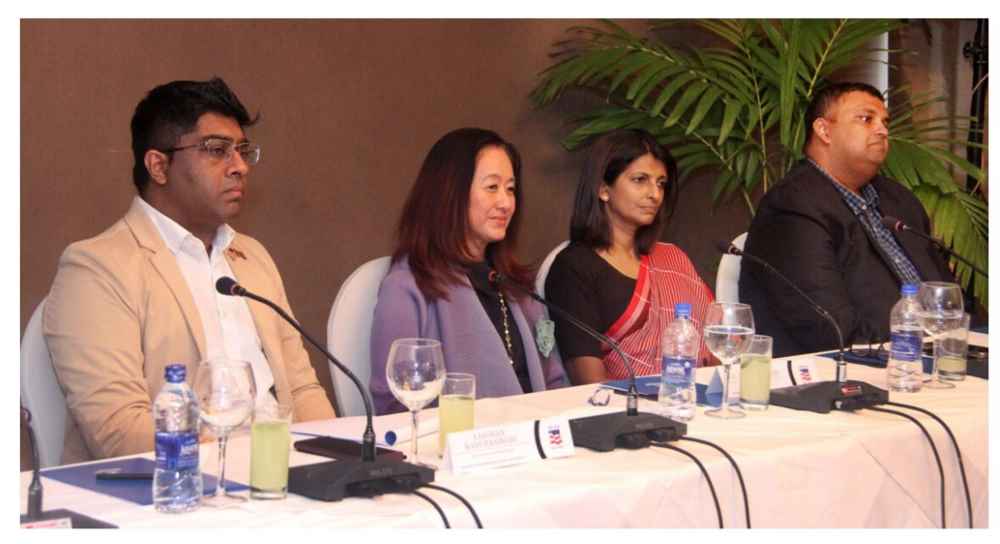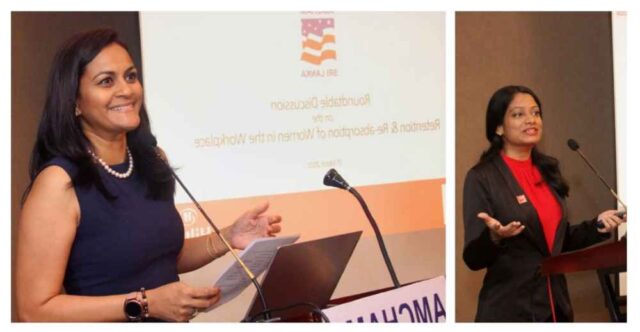
AmCham Sri Lanka recently organized a roundtable conference, gathering more than 60 C-level executives from diverse industries to deliberate on and develop strategies aimed at addressing the persistent issue of female attrition in the workforce.
At the event, Great Place to Work (GPTW) played a significant role as a key partner and presented their extensive research on Retention & Re-absorption of Women in the Workplace. The presentation delivered by Ruwani Alwishewa Head of Assessment Business & Client Services at GPTW provided valuable insights into the challenges faced by women in the workforce, and the factors that contribute to their attrition.
Delivering a comprehensive overview of the Trends Shaping Workplace Culture in 2023. the most prominent trends outlined was the increasing demand for flexibility in the workplace, which has become a standard expectation among the workforce. The concept of Non-linear career paths emphasized the importance of employees possessing a diverse range of skills and being adaptable to change. The significance of soft skills was highlighted. Additionally, the presentation delved into the growing use of AI in the workplace. The importance of mental health in the workplace was another significant aspect, with organizations being urged to prioritize employee wellbeing. The presentation also touched on the importance of Digital Readiness, Diversity, Equity, and Inclusion, acknowledging the increasing focus on these issues and their impact on overall workplace culture.
Several factors were identified as contributing to why women were leaving the labor force in Sri Lanka. Sociocultural expectations emerged as a key factor, with women often expected to prioritize domestic responsibilities over their careers. The increase in responsibilities and burnout resulting from the dual burden of work and family was also highlighted. Poor work-life balance, under recognition, and underpayment were identified as additional factors that make it challenging for women to remain in the labor force. Foreign employment opportunities, often driven by the need to earn a better income, was shown to also contribute to the exodus of women from the Sri Lankan labor force. Addressing these issues and providing the necessary infrastructure and support could lead to better retention rates of women in the workforce.

It was shown that employees’ priorities have shifted over the past three years, with a focus on impartiality in performance evaluation, equity in compensation, and collaboration with employees. Work-life balance and involvement in decisions have also become increasingly important. Adapting to these evolving needs is crucial to creating an inclusive work environment.
GPTW also shared strategies and practices for organizations to retain and re-hire female employees. These included providing career advancement opportunities, fair workload distribution, recognition, and work-life balance support. Additionally, ensuring equal pay for all employees was crucial. Addressing these needs will lead to a more inclusive and productive workplace.
Each of these findings of GPTW were particularly useful in the discussions and recommendations generated at the roundtable discussion that was centered around the same topic and was co-chaired by Kshanika Ratnayaka, CEO & Director of Great Place to Work in Sri Lanka along with Head of Chamber of AmCham SL – Vrai Raymond.
In addition, Sumani Siyabalapitiya, of Verite Research presented on the topic “Supporting Sri Lankan Women to Enter and Remain in the Workplace” which was based on a study by Verité Research on “Costs Of Doing A Job For Urban Women In Sri Lanka“
Chief Guest at the occasion the Ambassador of the United States of America in Sri Lanka, HE Julie. J. Chung drew attention to the significant potential benefits of increased female participation in the workforce in Sri Lanka. Citing estimates, she noted that the country could potentially add a staggering USD 20 billion to its annual GDP by 2025 if women were to play a more active role in the workforce.



